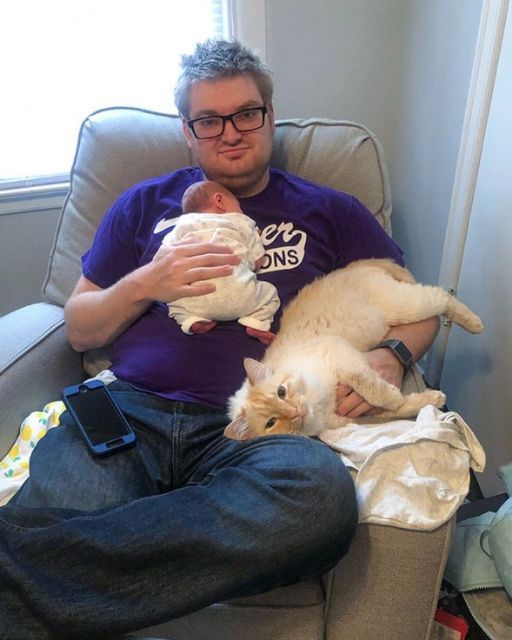I used to think I understood what silence meant. Growing up with my autistic brother Keane taught me how to notice the things most people miss—a tiny flick of his eyes, the way he lined up pencils in a perfect row, arranged by color and size, the quiet rituals that shaped our childhood. You learn to be patient, or at least pretend to be, because pretending was what helped us all survive. Keane was diagnosed with autism when he was three, and I was six.

I don’t remember the exact moment we were told, but I remember the change in our home. It got quieter. My mom became exhausted all the time, and my dad grew angry over small things like loud cartoons or the sound of a chip bag. I learned quickly how to be invisible. But Keane didn’t change—he stayed sweet, distant, and often smiled at ceiling fans or clouds, rarely at people. He never spoke. Not back then, and not for years. Fast forward to a Tuesday that felt like every other chaotic day. My baby, Owen, had just turned six months and was in full teething mode—constantly fussy, hard to soothe, and practically glued to my hip.
My husband, Will, was working longer hospital shifts, and I felt like I was being held together by coffee and to-do lists. Keane had been living with us for six months by then, ever since we brought him home after our parents passed—Dad from a stroke and Mom from cancer. He had been in state housing, and after seeing how withdrawn he’d become, I knew I couldn’t leave him there. When I asked if he wanted to move in, he didn’t speak—just nodded slightly, eyes fixed somewhere beyond me. Life with Keane was quiet. He didn’t speak, didn’t ask for anything, followed his routines, and kept mostly to himself.
He hummed a lot—soft, repetitive humming—and while it drove me a little crazy at first, I’d gotten used to it. That Tuesday, after Owen’s third meltdown of the morning, I finally got him down for a nap and took a rare moment to shower. I stepped into the water like it was a luxury spa, letting myself breathe. That’s when I heard the scream—Owen’s full-volume, something-is-very-wrong cry. I flew out of the shower, shampoo still in my hair, heart racing, and ran down the hall. But when I got there, I didn’t find disaster. I found Keane sitting in my armchair—he’d never sat there before—with Owen asleep on his chest. One of his hands gently rubbed Owen’s back in the exact rhythm I used, and his other arm cradled him perfectly.
Owen looked peaceful, his little drool bubble proof that he’d been out for a while. Even our cat Mango was curled up on Keane’s lap, purring. I stood there in shock. Then Keane looked up—not directly at me, but near me—and whispered, “He likes the humming.” It hit me like a wave. Not just because he spoke, but because of how present he was. “He likes the humming,” he repeated. “It’s the same as the app. The yellow one with the bees.” I realized he was talking about the lullaby app we used for Owen. I nodded, teary-eyed. “The lullaby one,” I said. Keane nodded again. That moment changed everything. I let him hold Owen a little longer. I watched them breathe together, expecting Keane to retreat the way he always had when anyone focused on him. But he didn’t. He stayed. So I asked him to help feed Owen later that day. Then the next. A week later, I left them alone for twenty minutes. Then an hour. One day, I returned home to find not only had Keane changed Owen’s diaper, but he’d also organized the changing table supplies by color. He began talking more too—simple, clear statements. “The red bottle leaks.” “Owen likes pears better.” “Mango hides when the heater clicks.” I cried more that week than I had all year. Will noticed too. “It’s like he’s waking up,” he said. But it wasn’t just heartwarming—it was terrifying in its own way. I realized how little I had truly seen Keane before. I’d accepted the silence without ever questioning if he wanted to give more. And now that he was giving, I felt the weight of the moments I had missed. Then one night, I came home from a Target run to find Keane pacing, not rocking like when he was anxious, but walking in tight steps. Owen was crying in the nursery, and Mango was scratching at the door. Keane looked at me, panicked. “I dropped him,” he said. My heart stopped. “In the crib,” he added. “I didn’t want to wake him. He hit the side. I’m sorry.” I rushed in—Owen was fine, sleepy, not even crying anymore. When I came back, Keane was sitting on the couch, whispering, “I ruined it” over and over. I sat beside him and said, “You didn’t ruin anything.” “But I hurt him,” he said. “No. You made a mistake. That’s human.” He looked at me like he wasn’t sure. I told him, “You’re not broken, Keane. You never were. I just didn’t know how to listen.” He cried then—silent, full sobs—and I held him like he’d held Owen. Not to fix him. Just to see him. Six months later, Keane volunteers at a sensory play center. Owen’s first word wasn’t “Mama” or “Dada.” It was “Keen.” I never knew silence could hold so much. And that one whispered sentence—“He likes the humming”—could open our world. But it did. And now we’re finding our way forward, not just as siblings, but as a family that finally hears each other.





